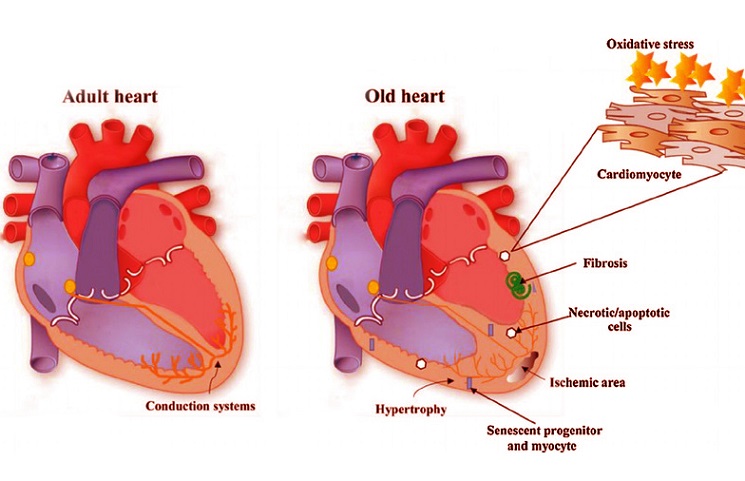Nikhil Prasad Fact checked by:Thailand Medical News Team Jan 27, 2025 10 months, 3 weeks, 4 days, 14 hours, 38 minutes ago
Medical News: Aging and Cardiac Changes: A Global Concern
The world's aging population continues to grow rapidly predictions that by 2050, over 22% of the global population will be above 60 years old. This demographic shift brings with it an increase in age-associated health issues, particularly cardiovascular diseases, which are among the leading causes of death and disability worldwide. Understanding the underlying mechanisms that contribute to cardiac aging has become a crucial focus of biomedical research.
 Role of Nuclear Factor Kappa B Suppression in Cardiac Aging Responses
Role of Nuclear Factor Kappa B Suppression in Cardiac Aging Responses
A recent study spearheaded by Brazilian researchers from the University of São Paulo and its affiliated medical institutions has shed light on the role of nuclear factor kappa B (NF-κB) in cardiac aging. This
Medical News report delves into how suppressing NF-κB in cardiomyocytes (heart muscle cells) reveals critical insights into aging-related cardiac responses.
What Is NF-κB and Why Does It Matter?
NF-κB is a protein complex that acts as a transcription factor, regulating the expression of genes involved in inflammation, immunity, and cell survival. Its role in aging has drawn significant attention because of its dual nature - while it may promote harmful inflammation under certain conditions, it also supports cellular repair and survival.
The research team utilized transgenic mice engineered to suppress NF-κB activity specifically in cardiomyocytes. These mice, referred to as 3M, were compared to normal (wild-type) mice in a study designed to evaluate the effects of NF-κB suppression on cardiac aging.
Methodology: A Closer Look
The study involved four groups of mice: young and old wild-type mice and young and old 3M mice. Researchers conducted a variety of assessments, including survival analyses, cardiac function tests, and molecular evaluations, to understand how NF-κB suppression impacts cardiac aging.
Key techniques included echocardiography to measure heart function, histological staining to assess tissue changes, and molecular analysis to evaluate markers of cellular senescence and DNA damage.
Significant Findings from the Study
1. Reduced Lifespan in 3M Mice
The 3M mice exhibited a shorter lifespan compared to their wild-type counterparts, with median survival dropping from 27 months in wild-type mice to 23 months in the 3M group. This finding underscores the potential protective role of NF-κB in aging.
2. Cardiac Hypertrophy and Fibrosis
Both aged wild-type and 3M mice displayed evidence of cardiac hypertrophy - an increase in heart muscle size. However, hypertrophy was more pronounced in 3M mice, even in young individuals, suggesting that NF-κB suppression accelerates these structural changes. Histological analysis further revealed increased collagen d
eposition (a marker of fibrosis) in the hearts of 3M mice.
3. Impaired Cardiac Function
Echocardiographic evaluations showed that aged 3M mice suffered from significant cardiac dysfunction, including reduced ejection fraction and diastolic dysfunction. These changes indicate a decline in the heart's ability to pump blood effectively and fill properly during relaxation phases.
4. Markers of Cellular Aging
Aged 3M mice exhibited elevated levels of senescence markers, including p21 and p53 proteins, which are associated with cellular aging and stress. Additionally, the activity of senescence-associated beta-galactosidase (SA-β-gal), a hallmark of aging cells, was significantly higher in 3M mice, particularly in the aged group.
5. DNA Damage
The study also highlighted increased DNA damage in 3M mice, as evidenced by higher levels of phosphorylated H2A.X, a marker of DNA damage response. Interestingly, telomere shortening, another hallmark of aging, was observed in wild-type mice but not in the 3M group, suggesting that other mechanisms may drive aging in the absence of NF-κB.
Implications for Aging and Cardiac Health
The findings suggest that NF-κB plays a crucial regulatory role in maintaining cardiac structure and function during aging. While chronic activation of NF-κB has been implicated in inflammation and adverse cardiac remodeling, its suppression appears to exacerbate aging-related changes in the heart. This highlights the complex, context-dependent nature of NF-κB signaling.
Conclusion: Charting a Path Forward
The study reveals that NF-κB suppression in cardiomyocytes accelerates cardiac aging, leading to hypertrophy, fibrosis, cellular senescence, and functional decline. These findings challenge the notion that simply inhibiting NF-κB is beneficial for aging-related conditions. Instead, they underscore the need for nuanced approaches that balance NF-κB's protective and detrimental effects.
Future research should explore the specific pathways through which NF-κB influences cardiac aging and investigate potential therapies that modulate this pathway without causing harm. Such insights could pave the way for targeted interventions to mitigate age-related cardiovascular diseases.
The study findings were published in the peer-reviewed journal: Biomedicines.
https://www.mdpi.com/2227-9059/13/1/224
For the latest on Cardiac Aging, keep on logging to Thailand
Medical News.
Read Also:
https://www.thailandmedical.news/news/doctors-warn-that-covid-19-infections-can-induce-a-dangerous-condition-known-as-complete-heart-block
https://www.thailandmedical.news/news/bulgarian-study-highlights-benefits-of-black-chokeberry-juice-for-heart-health
https://www.thailandmedical.news/news/covid-19-causes-qtc-prolongations-and-disruptions-in-cardiac-electrophysiology
https://www.thailandmedical.news/articles/cardiology
